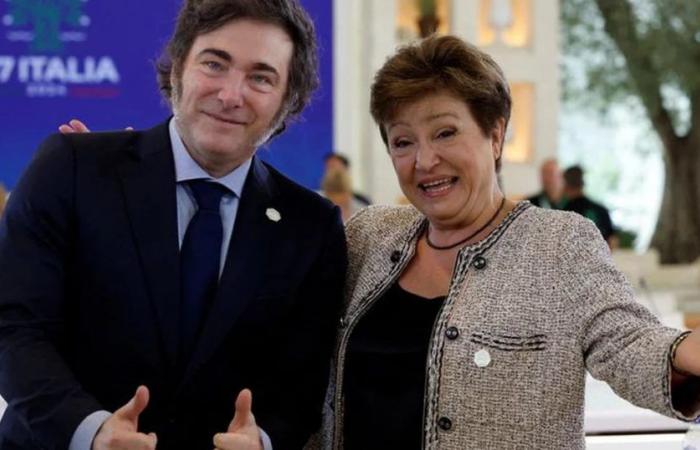
The Monetary Fund acknowledged to the Government that in the first quarter it was able to complete almost two thirds of the adjustment that he needs to eliminate the deficit in the first year of his mandate, but warned that the economic team will have to rely from now on on the tax increases included in the tax package to improve the “quality” of the fiscal red cut.
The organization recalculated downwards the target for public accounts that the Government will have to meet to remain within the objectives of the current program. Thus, while in the previous review it expected a surplus equivalent to 2 points of GDP, now that goal was reduced to 1.7 points. To reach that point, the Casa Rosada would need 5% of the Gross Domestic Product adjustment.
Of that total, the IMF calculated, the Government obtained almost two thirdssomething that was “supported by measures of income and, more importantly, discretionary spending cuts”, stated the organization. To put it in numbers: the partial progress of the adjustment was explained by a higher than expected collection (1.1% of GDP against 0.8% at the beginning of the year) due to the PAIS tax and cuts in subsidies (0.6%). and capital expenditures (0.8 percent). Going forward, the Fund recommended to the economic team change the “profile” of that setting.
The Government achieved almost two-thirds of the total adjustment it will need this year, something that was “backed by revenue measures and, more importantly, cuts in discretionary spending,” the agency stated.
“To safeguard the planned adjustment against risks to revenues from contraction in activity and less favorable commodity export prices and ensure adequate burden sharing, policy is expected to be more based on higher quality structural measures. Although the adjustment is large by historical and country standards, successful stabilization episodes have often been associated with fiscal consolidation of similar magnitudes,” the organization’s technicians warned.

The fiscal package “contains some high-quality measures to increase revenue this year,” the Monetary Fund continued. In that sense, he described as “vital” the recomposition of the fourth category of the tax on Profits which is included in the fiscal package, a measure that did not obtain the approval of the Senate but that, it is expected, the Executive Branch will seek to ratify in Deputies. “It should incorporate around ten percent of formal sector workers into the Profit regime,” the agency considered.
“The package also includes a gradual reduction in taxes on personal assets (Personal property) with an early distribution option; and better coverage of excise taxes on tobacco. The higher expected VAT revenues associated with planned rate adjustments of energy add another element of high quality fit“, described the Fund’s technicians.
On this level, the IMF believes that the fiscal package will give the Government a 0.6% of GDP contribution to the total fiscal adjustment. With that, “the authorities would be on track to fulfill their fiscal plan for 2024,” Washington anticipated. A hitherto unknown number is how much the Government expects to collect through the special tax for the money laundering. It will be, it is hoped, a 0.3% of GDPalthough the IMF preferred not to include it in its base scenario.
But they also noted that in the next two months, according to the parliamentary dynamics, Economy should propose a plan to lower tax expenses -that is, taxes that the State stops collecting due to differential tax schemes- to “eliminate other reduced tax rates that benefit specific regions or sectors.”

The organization described as “remarkable” the adjustment of the first months of the libertarian government’s mandate, with a 26% cut in spending in real terms and a drop in income of 8% in real terms, which resulted in a surplus of 0 .2% of GDP in the first quarter. “On the revenue side, higher excise taxes on fuel, export revenues and temporary taxes on access to foreign currency for imports (PAIS tax) are helping to partially offset real falls in domestic taxes,” the technicians said.
“The spending cuts have been made through measures under the control of the Executive, including: discretionary cuts in capital spending and transfers to state companies and provinces, which has forced adjustments in all of these entities; increases in energy, transportation and water rates; limits on public salary increases; and the strictest management of decentralized public entities,” he listed.
The eighth revision reset some numbers in the goal scheme. In fiscal terms, for example, the requirement for a primary surplus is much more marked than in the previous quarterly report. In numbers: until the end of March the Government needed to show $962 billion of primary surplus and ended with 3.8 billion pesos.
A hitherto unknown number is how much the Government expects to collect through the special tax for money laundering. It is expected to be 0.3% of GDP, although the IMF preferred not to include it in its base scenario.
By the end of this month, until staff report previous expected $1.9 billion of primary surplus and that number was raised to $4.6 billion. As a reference, until April the Ministry of Finance already accumulated $4.1 billion. And for the third quarter, the last goal of the current program, the surplus expected by the IMF went from being $2.8 billion almost $7.7 billion.
The Government, in a section in which it gives its own vision of what was discussed with the staff, assured that in a scenario of possible parliamentary delays in approving the fiscal package and other initiatives, its plan B would include more marked cuts in some areas. “While we continue to work with Congress to build consensus for necessary reforms, there could be further delays in the final passage of our tax and reform legislation,” he said.
“In this still uncertain context, we will continue to adapt our economic policies to changing circumstances to ensure that our program objectives are met. “We are firmly committed to safeguarding our hard-earned political credibility, established through our unbreakable fiscal anchor and our ambitious reserve accumulation target,” the economic team said, anticipating that if those risks materialize they will take action.
Among them, in the fiscal area, they would seek to “implement measures to strengthen and expand special taxes, particularly on fuels; accelerate the reduction of spending on subsidies in both energy and transportation; further rationalize the transfers to the provinces and state-owned companies; and further improve tax administration and spending controls,” the Economy Ministry said.





